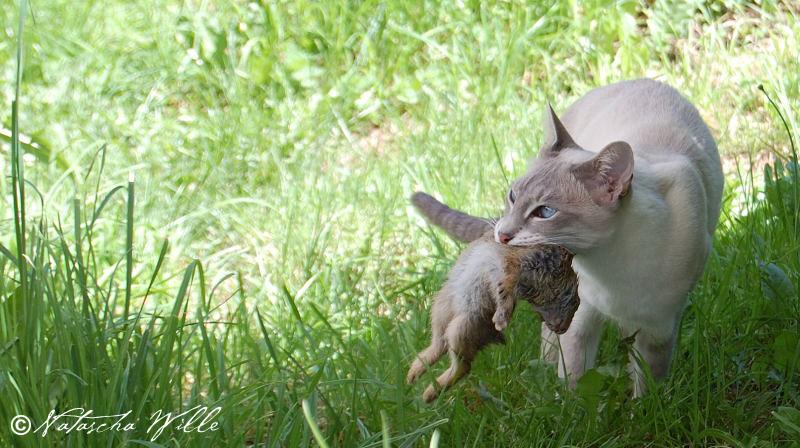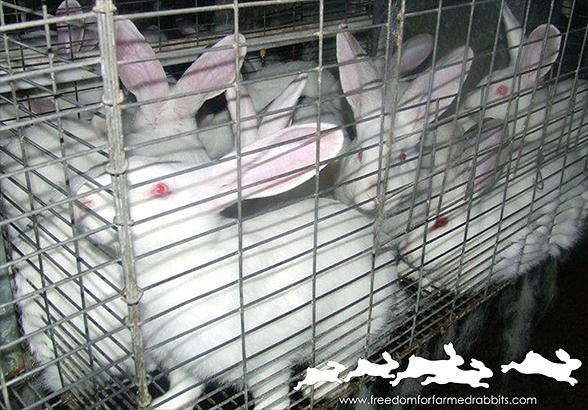Many who feed a raw meat diet to their cats endeavor to replicate the natural diet as closely as possible. This includes feeding meat that contains “real” bone, which would be achieved by grinding the dressed carcass of smaller animals such as chickens, quail, and rabbit whole. Many limit their meat choices to animals which they believe cats might also be catching themselves “in the wild”. Feeding chicken and rabbit to cats has become very popular because of these thoughts.
At first glance there seems nothing wrong with this ideology. If one examines the idea more closely, however, there may be some ethical questions which need to be addressed.
Rabbits are frequently falsely regarded as the perfect food alternative to mice for cats, because many believe rabbits are rodents. However, rabbits are NOT rodents. Rabbits belong to the order of Lagomorpha, which is a different order to that of Rodentia. The diet and natural behavior of rabbits differs considerably from that of rodents. In veterinary medicine, rabbits are most commonly treated like little horses concerning their diet and dietary diseases, because their physiology in that regard is almost identical.
Some cats, wild and domestic, do hunt rabbits or hare. For most wild cats, however, rabbits are not their main prey, which means that rabbit meat is as good a meat alternative for cats as other meats, but not better.
One significant aspect of feeding rabbit meat is the question if it is ethical.
Commercial or farmed rabbits, e.g. those sold for human consumption and those sold as raw pet food, are not raised in conditions I would consider humane. In many ways, a commercial rabbitry is set up much in the same way as a barn intended to keep battery-cage laying hens. The rabbits are housed in dark, closed buildings and kept in rows of very small, all wire cages without bedding, staked 2-3 rows high. Mortality of the rabbits is high and the existence of any quality of life questionable. Producers who raise commercial meat rabbits also supply laboratories with rabbits for animal testing. If you buy commercial rabbit meat you are likely supporting animal testing in a round-about way.
“Fryer” rabbits intended for meat are only 8-12 weeks of age at the time of slaughter, which is often before domestic rabbits would be weaned from their mothers. “Fryer” rabbit is the most typical rabbit meat available, because it is the most profitable for the producer. On average, a commercial dressed fryer rabbit carcass weighs 2.75lbs. (1.2kg). With some supplements and water added, a 2.75 lb. fryer carcass makes 14 days of food for one cat. In one year, a single cat would eat 24 rabbits of that size.
In comparison, market weight for beef cattle is 1,200-1,400 lbs which they reach between 18 and 22 months of age. The weight of the carcass would be between 600-700 lbs. with 300-350 lbs. of pure meat. 350lbs. of meat with supplements and water added would make 1750 days of cat food or feed one cat for 4.7 years! In the same period, a cat on a whole carcass rabbit diet would have consumed 112 rabbits raised in inhumane conditions, while the butcher steer, if grass fed, would have enjoyed 1.5 to 2 years grazing on the range.
In my opinion, it is not just important to feed our cats right, but it is equally important to do so ethically. There is no justification in accepting the suffering of one animal for the “benefit” of another. Cats can not be vegetarians, but we as caregivers have the power to choose which meats we buy and which producers we support. If you can not find rabbit meat from a small producer, who raises his or her rabbits humanely and with respect, then you may be interested in raising rabbits for your cat yourself or let your cat catch her own rabbits. Otherwise, it might be best to forgo the romantic idea of feeding rabbit altogether.
When I speak about rabbits, I speak with experience. For some years now I have raised Belgian Hare rabbits to preserve their kind. It is my sincere opinion that it completely unethical to raise rabbits in captivity to feed domestic cats, and incomparable to wild cats hunting wild rabbits or hares.
In their dietary habits rabbits are very different from cats, but in other ways they are very much the same. They are the size of cats and live in socially complex family groups where they form friendships and unbreakable bonds. Rabbits can live with people very much like other house pets do, and learn quickly to use a litter box! They know their names, can be very affectionate, and explode with pure joy of life if given a chance. Rabbits are vegans, and can make the perfect companion for some, because a rabbit owner is not faced with many of the ethical considerations that a cat owner have to contemplate.
To learn more about farmed rabbits, please visit www.freedomforfarmedrabbits.com. This is a advocacy group in Australia, but conditions for commercially farmed rabbits are the same world wide.
Compassion in World Farming, an animal welfare organization based in the United Kingdom is also very outspoken about the cruelty of factory style farmed rabbits.


